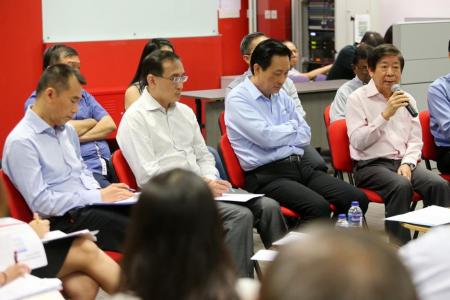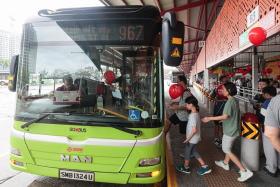Khaw Boon Wan apologises for tunnel flooding. Calls incident 'preventable', 'sad and unnecessary'
Tunnel flooding that led to 20-hour service disruption on North-South Line 'preventable', caused by maintenance lapse
Transport Minister Khaw Boon Wan and SMRT bigwigs yesterday apologised for the MRT tunnel flooding incident that led to a 20-hour train disruption affecting more than a quarter of a million commuters.
Addressing the Oct 7 weekend incident for the first time, Mr Khaw said at a media briefing in Bishan depot: "The bottomline is MRT tunnels should not be flooded, full stop."
He later added: "The SMRT team in charge of maintaining the anti-flood system at Bishan has failed us."
After parts of the underground tunnel near Bishan station was submerged in water up to waist level, SMRT was forced to stop train services along six stops of the North-South Line, in one of Singapore's worst public transport breakdowns.
Calling the incident "preventable" and "sad and unnecessary", Mr Khaw acknowledged that it has affected public confidence in SMRT.
"It should not have happened. We are all sorry that it did," he added.
"Our findings is that the anti-flooding system there had been poorly maintained...
"Basically, MRT tunnels are designed to handle our weather and can cope with very extreme storms far more severe than what we saw or what we experienced in the last two weeks."
SMRT and Land Transport Authority (LTA) officials told the briefing that a maintenance lapse had caused sludge and debris to gather in the lower compartment of a storm water pit that was supposed to collect and drain out rainwater in the tunnel between Bishan and Braddell stations.
LTA said the pit was likely almost full before Oct 7.
Inspection and maintenance of the float switches, which trigger the pumps, were due last month but had been postponed by the maintenance team, which claimed it could not get a slot for track access during engineering hours.
Speaking after Mr Khaw, SMRT chairman Seah Moon Ming bowed in apology and said SMRT took "full responsibility" for the incident.
"SMRT has failed to prevent this incident from happening," he added.
Mr Desmond Kuek, SMRTpresident and group chief executive, echoed Mr Seah's sentiments, adding that many of the major train disruptions were due "in some part, or all, to human error or failure".
SMRT later said it had recently taken steps to restructure its engineering and maintenance teams for its trains.
These changes include the setting up of a maintenance and engineering systems group, led by a newly appointed chief maintenance officer/senior vice-president.
A future systems division, led by a chief technology officer, will be in charge of assessing technology to do predictive maintenance.
SMRT also said that it would take steps to prevent a repeat of the flooding incident, including replacing parts of the water pump systems at all five flood protection systems it is in charge of by the end of the year.
It will also inspect water pumps and flood sensors more rigorously every month, instead of every three months previously.
Asked whether SMRT would be fined for the incident, Mr Khaw said it was for LTA to decide, but he would prefer not to "go back to this old system of penalties and fines".
"It created a very adversarial relationship between the regulator and the operator," he said.
"When you have this acrimonious relationship, it is very difficult to achieve excellence."
FOR MORE, READ THE STRAITS TIMES TODAY
Get The New Paper on your phone with the free TNP app. Download from the Apple App Store or Google Play Store now



